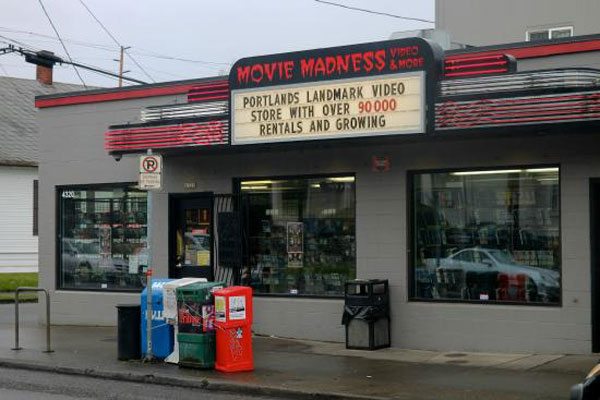
October 11, 2017; Oregonian
Quick—what do Cleveland’s Playhouse Square, the Philadelphia Inquirer, and the Green Bay Packers all have in common? Answer: They are all owned by nonprofit corporations. Now Portland, Oregon residents are also organizing to preserve a local institution, a video store named Movie Madness, by having it be run by a nonprofit.
NPQ has covered a similar story before. Three years ago, Scarecrow Video, located in Seattle’s University District, engaged in a Kickstarter campaign to keep a video store in operation by converting the store to nonprofit ownership. The campaign worked, raising $130,697. A collection of 130,000 films was preserved and the store operates to this day. A May 2017 op-ed co-authored by Seattle City Council member Lisa Herbold and Director of the Office of Film and Music Kate Becker lauded the nonprofit for its cultural contribution to the City: “With a robust section dedicated to housing the works of local filmmakers,” Herbold and Becker write, “these films give others a glimpse into the artistic soul of Seattle. With Seattle rapidly growing and changing, these films also serve as time capsules of our local history and environment.”
In Portland, the effort is being driven by the desire of founder Mike Clark, age 71, to retire. Given the prevalence of streaming services today, it’s no surprise that not many folks want to buy video stores. That said, the store’s collection of an estimated 84,000 titles is far more extensive than the 7,000 or so titles available through streaming on Netflix or Amazon’s 20,000 titles.
Clark estimates his collection is worth $500,000, but he has agreed to sell it to the Hollywood Theater, a nonprofit-owned business itself for 20 years, for half that amount. The theater is seeking to raise the money needed through a Kickstarter campaign. It has raised over $160,000 so far. Additionally, the nonprofit has secured a $90,000 grant from the James F. and Marion L. Miller Foundation to provide two years of operating support for the project, contingent on a successful $250,000 Kickstarter raise.
Sign up for our free newsletters
Subscribe to NPQ's newsletters to have our top stories delivered directly to your inbox.
By signing up, you agree to our privacy policy and terms of use, and to receive messages from NPQ and our partners.
Doug Whyte, executive director of the Hollywood Theater, which will manage the video store provided the Kickstarter campaign succeeds, has indicated that his nonprofit has plans that extend far beyond operating a video store. According to Cameron Crowell, writing in the Portland Mercury, Whyte envisions the store as being a place that offers “everything from screening Movie Madness’s rare films on the Hollywood’s big screen to making sure Portlanders can continue to enjoy the collection from their homes.”
There’s talk of adding a screening room, hosting public events, asking people from the local film community to curate sections, having a monthly membership program. There comes the problem that some people don’t even have DVD or VHS players anymore, so we want to have them available for cheap at the store as well.
We wish the organizers in Portland well, and hope they achieve the same success as their counterparts have achieved in Seattle. But it is important to underscore that there’s more to this story than preserving video stores, important though that may be. In fact, the nonprofit structure can be a very good strategy for preserving community-based entities in a wide range of sectors.
Take the three examples mentioned above:
- The Green Bay Packers’ nonprofit public benefit corporation structure dates from 1923. It is safe to say that had Green Bay residents not adopted this ownership structure, the team would have long ago moved to a larger market. Instead, nonprofit ownership ensures that the team remains a community asset. Packers revenues last fiscal year totaled $441.4 million.
- Cleveland’s Playhouse Square Foundation, founded in 1973, operates a theater district. Revenues in 2014 were $77 million, according to its Form 990 filing. The nonprofit has not only been successful in Cleveland, but it helped launch a national trend of reviving historic theater districts.
- The Philadelphia media nonprofit that operates the Inquirer was founded just last year when H.F. “Gerry” Lenfest donated the paper and related media assets to the Institute for Journalism in New Media. According to the city’s chamber of commerce, the newly nonprofit-owned Philadelphia Media Network has 2,500 employees and revenues that exceed $100 million. The long-term success of nonprofit journalism remains to be seen (although the Poynter Institute’s long ownership of newspapers in the Tampa Bay region illustrates potential staying power), but clearly at least the start of a wave of nonprofit innovation in journalism is highly visible.
In short, whether it be a video store, theater district, or media company, increasingly we are seeing nonprofits being employed to preserve community values and keep cultural institutions running. This is a trend that may soon be arriving in a neighborhood near you.—Steve Dubb













